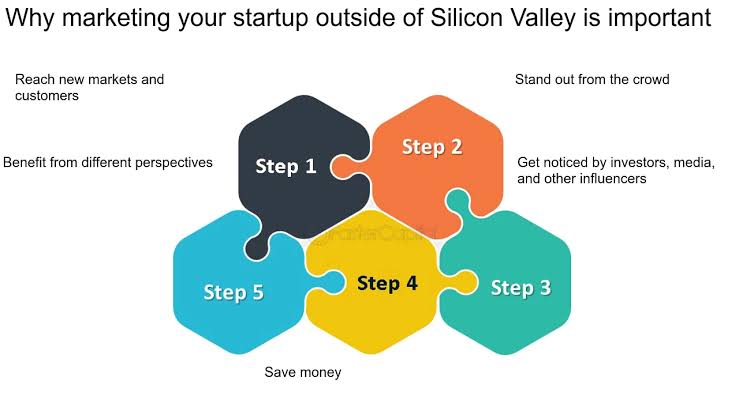Silicon Valley startup marketing is a unique blend of disruptive thinking, storytelling, data-driven decision making, and community building. By embracing innovation, leveraging influencers, and adopting an agile mindset, these startups have revolutionized the way marketing is approached.
As entrepreneurs and businesses around the world seek to replicate the success of Silicon Valley startups, it is essential to learn from their strategies and adapt them to their own contexts.
By embracing disruption, crafting compelling narratives, leveraging influencers, relying on data-driven decision making, adopting an agile approach, and building strong communities, startups can enhance their marketing efforts and increase their chances of success.
In this article, we delve into the unique strategies and approaches employed by Silicon Valley startups, unveiling the secrets behind their remarkable marketing prowess.
Embracing Disruption: One of the defining characteristics of Silicon Valley startup marketing is its relentless pursuit of disruption. Startups in this region have a deep understanding of their target audience and identify pain points or unmet needs.
They leverage this knowledge to create innovative solutions that challenge traditional norms and industry conventions. By positioning themselves as disruptors, these startups are able to generate attention, spark curiosity, and capture market share.
Building a Compelling Narrative: Successful Silicon Valley startups understand the power of storytelling in capturing the imagination of their audience. They craft a compelling narrative around their product or service, effectively communicating its value proposition and the problem it solves.
By tapping into emotions and aspirations, they create a connection with their target market, making their brand more relatable and memorable. This narrative-driven marketing approach helps startups stand out in a crowded marketplace and resonate with their customers on a deeper level.
Leveraging Influencers and Thought Leaders: In the digital age, influencers and thought leaders play a crucial role in shaping consumer opinions and driving purchasing decisions. Silicon Valley startups recognize this influence and actively seek out partnerships with relevant influencers in their industry.
By collaborating with influencers who align with their brand values and target audience, startups gain access to a larger, more engaged audience. These influencers can provide valuable endorsements, testimonials, and authentic content, significantly amplifying the startup’s marketing efforts.
Data-Driven Decision Making: Data is the lifeblood of Silicon Valley startups, and marketing is no exception. Startups in this region leverage data analytics and advanced tracking technologies to gain insights into consumer behavior, measure campaign effectiveness, and optimize their marketing strategies.
They employ A/B testing, user feedback loops, and analytics tools to refine their messaging, targeting, and overall marketing approach. This data-driven decision-making process enables startups to make informed choices, identify trends, and stay ahead of the competition.
Agile and Iterative Marketing: Silicon Valley startups embrace an agile and iterative approach to marketing. They understand that the market landscape is constantly evolving, and consumer preferences change rapidly.
As a result, they prioritize speed and flexibility in their marketing efforts. Startups launch minimal viable products (MVPs) or prototypes early on to gather feedback, iterate, and improve.
This iterative process extends to their marketing campaigns, where they experiment with different channels, messages, and tactics, quickly adapting and optimizing based on data-driven insights.
Community Building and User Engagement: Building a vibrant community around a product or service is a cornerstone of Silicon Valley startup marketing. Startups foster a sense of belonging among their users by creating engaging experiences, providing exceptional customer support, and facilitating user-generated content.
By nurturing a loyal community, these startups benefit from word-of-mouth marketing, customer advocacy, and valuable user insights. The strong bonds formed within these communities serve as a powerful marketing force, propelling the startup’s growth and expanding its reach.
Silicon Valley, the birthplace of technological innovation and home to some of the world’s most successful startups, has long been regarded as the epicenter of modern entrepreneurship. It is a place where groundbreaking ideas meet cutting-edge technology, and dreams turn into reality. Central to the success of Silicon Valley startups is their ability to master the art of marketing.
Read Also: Exploring Successful Startup Marketing Case Studies
Silicon Valley Startup Marketing Trends

Silicon Valley has long been recognized as the global hub of innovation and entrepreneurship, where startups emerge with groundbreaking technologies and disruptive business models. As Silicon Valley Startup Marketing Trends strive to gain market traction and attract customers, marketing plays a pivotal role in their success.
Hyper-Personalization: Tailoring Experiences; In an era of information overload, Silicon Valley startups are embracing hyper-personalization to cut through the noise and deliver tailored experiences to their customers. By leveraging advanced data analytics and machine learning algorithms, these startups gather insights into individual preferences, behaviors, and needs.
This allows them to customize their marketing messages, products, and services to match the unique demands of each customer segment. Whether it’s personalized email campaigns, targeted advertisements, or dynamic website content, hyper-personalization creates a more engaging and relevant experience, fostering stronger customer relationships and driving brand loyalty.
Influencer Marketing: Amplifying Reach; Influencer marketing has witnessed exponential growth in recent years, and Silicon Valley startups have taken notice. Collaborating with social media influencers, bloggers, and industry experts provides startups with an effective avenue to amplify their reach and tap into niche communities.
Startups carefully select influencers whose values align with their brand and target audience, allowing for authentic storytelling and genuine endorsements. By leveraging the influencer’s existing following and credibility, startups gain access to a highly engaged and receptive audience, enhancing brand awareness and driving conversions.
Content Marketing: Storytelling with Purpose; Content marketing continues to be a powerful tool for Silicon Valley startups to educate, inspire, and connect with their target customers. However, the emphasis has shifted from generic content creation to purposeful storytelling. Startups are investing in high-quality, informative, and emotionally compelling content that resonates with their audience.
They utilize various formats, such as blog posts, videos, podcasts, and interactive experiences, to convey their brand story, showcase expertise, and provide value to customers. Through storytelling, startups establish themselves as thought leaders, build trust, and differentiate themselves in competitive markets.
Social Impact Marketing: Purpose-Driven Entrepreneurship; The rising trend of social impact marketing has become increasingly prominent among Silicon Valley startups. Today’s consumers are more conscious of the social and environmental impact of their purchasing decisions, and startups are aligning their marketing efforts with purpose-driven initiatives.
By integrating social responsibility into their business models, startups engage with socially conscious consumers, attract top talent, and build a positive brand image. Whether it’s supporting charitable causes, adopting sustainable practices, or promoting diversity and inclusion, startups leverage their marketing strategies to convey a strong sense of purpose and create a positive societal impact.
Data-Driven Marketing: Insights for Growth; In Silicon Valley, data is considered a strategic asset, and startups are leveraging it to drive marketing decisions. By employing robust analytics platforms and marketing automation tools, startups collect and analyze vast amounts of customer data.
This enables them to make data-driven decisions regarding target audience segmentation, customer journey optimization, and campaign performance tracking. Startups also utilize predictive analytics to forecast market trends, identify emerging opportunities, and optimize marketing budgets. By embracing data-driven marketing, these startups gain a competitive edge, improve marketing ROI, and enhance overall business growth.
Silicon Valley startups are continuously pushing the boundaries of marketing innovation. By adopting hyper-personalization, influencer marketing, purposeful content creation, social impact initiatives, and data-driven decision-making, these startups are effectively reaching and engaging with their target audiences.
As the startup ecosystem evolves, it is crucial for entrepreneurs and marketers alike to stay informed on the latest trends and adapt their strategies accordingly. The dynamic nature of the industry requires startups to stay agile, experiment with new techniques, and embrace a customer-centric approach.
Read Also: Unleashing the Power of Fintech Startup Marketing
Silicon Valley Startup Techniques

Silicon Valley Startup techniques employed by Silicon Valley startups go beyond traditional approaches, reflecting the region’s innovative and forward-thinking spirit.
By leveraging data-driven decision making, embracing agile methodologies, adopting growth hacking strategies, focusing on storytelling and branding, and utilizing influencer marketing and thought leadership, these startups create a formidable presence in their respective industries.
Aspiring entrepreneurs and marketers can draw inspiration from these techniques to drive the success of their own ventures, ultimately shaping the future of the startup landscape.
Data-Driven Decision Making: Silicon Valley startups are renowned for their data-driven approach to decision making. By leveraging advanced analytics and collecting vast amounts of user data, these companies gain valuable insights into customer behavior, preferences, and trends.
Armed with this information, startups can tailor their marketing campaigns to target specific demographics, optimize customer experiences, and make informed decisions that drive growth. The emphasis on data enables companies to iterate and refine their strategies for maximum impact.
Agile Marketing: The fast-paced nature of the technology industry demands agility in marketing approaches. Silicon Valley startups excel at adopting agile methodologies, allowing them to quickly adapt to market changes and stay ahead of the competition.
By employing techniques like rapid prototyping, A/B testing, and continuous optimization, these companies can fine-tune their marketing efforts in real-time. This iterative process enables startups to identify successful strategies and discard ineffective ones, ensuring they are always at the forefront of their target audience’s minds.
Growth Hacking: Growth hacking is a term synonymous with Silicon Valley startups. This innovative approach combines marketing, data analysis, and product development to achieve rapid and sustainable growth. Growth hackers utilize low-cost, unconventional methods to acquire and retain customers.
Techniques such as viral marketing, referral programs, and leveraging social media platforms enable startups to quickly scale their user base. By focusing on scalable growth, startups can achieve exponential results while keeping costs at a minimum.
Storytelling and Branding: Effective storytelling is a cornerstone of successful marketing for Silicon Valley startups. Entrepreneurs in the region understand the power of compelling narratives to engage and resonate with their target audience.
By crafting a captivating brand story, startups can create an emotional connection with their customers, differentiate themselves from competitors, and foster brand loyalty. Additionally, Silicon Valley startups invest in building strong brand identities and consistent visual aesthetics that embody their values and aspirations.
Influencer Marketing and Thought Leadership: Silicon Valley startups often leverage influencer marketing and thought leadership to enhance their visibility and credibility. Collaborating with industry experts, renowned influencers, or thought leaders allows startups to tap into their existing audiences, gain exposure, and build trust with potential customers.
Engaging in speaking engagements, guest blogging, or hosting webinars and workshops positions startups as industry leaders, further solidifying their credibility and attracting attention from both customers and investors.
Silicon Valley has long been hailed as the epicenter of technological innovation and entrepreneurial spirit. From groundbreaking startups to industry giants, the region has consistently produced remarkable success stories.
While groundbreaking ideas and technological prowess are critical components of this success, effective marketing strategies play an equally vital role.
Read Also: How to Know Which Medicated Fish Feed to Use